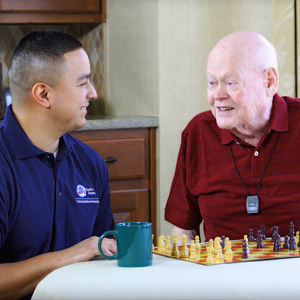Bruising As You Age
Do you as a caregiver have questions about what causes bruising and worry about the effects of bruising on your senior loved one?
Does the senior in your life often have unexplainable bruises? Do you as a caregiver have questions about what causes him or her to have unsightly black and blue marks and worry that there might be something seriously wrong with your loved one that needs attention? As alarming as these purplish marks can be, they're usually harmless.
With passing years, easy bruising becomes increasingly more common with the mildest bump or blow. Exactly what causes this? Over time our capillaries age and become more fragile and prone to rupture. Our skin also becomes thinner, losing the protective fatty layer that helps to cushion blood vessels against injury. Bruises form when the small blood vessels or capillaries near the skin's surface are broken by an injury. This causes blood to leak out of the vessels and a bright or dark red, purple or black mark appears.

The problem of frequent bruising with no apparent reason usually starts to show up after age 55, but long-time sun worshippers may see changes earlier. For many people, in fact, sun damage is thought to account for nearly all of age-related changes in the skin. The problem may be compounded if you smoke, too. Certain dietary supplements such as fish oil and ginkgo can have a blood-thinning effect and also increase your risk of bruising. So do some medications used in treating common conditions like allergies, asthma and eczema or more serious issues like blood clots that can cause strokes or heart attacks. Medications include:
- Nonsteroidal anti-inflammatory drugs, such as ibuprofen.
- Aspirin
- Anticoagulants such as coumadin or heparin.
- Antiplatelet medications.
- Corticosteroid-containing medications (applied to the skin, taken orally or injected).
- Medications that affect coordination can make you more prone to falls.
While you as a caregiver might not be able to completely prevent easy bruising in the senior in your life, there are some practical measures you can take that will go a long way towards helping to keep him or her bruise-free. De-clutter your household and remove items that could cause bumps or falls. Dress your senior in long-sleeved shirts and pants to add an extra layer of protection for their skin. Limit exposure to the sun and try to reduce further harm by applying sunscreen and covering up while outdoors. Apply moisturizers to the skin. That will relieve dryness and make skin give more easily.
There isn't much that can be done to treat a bruise once it has formed, although most bruises disappear eventually as the body reabsorbs the blood. Healing may take longer because of age.
Easy bruising can be an indication of a more serious condition such as a blood disease or a clotting problem. You should consult a doctor if you notice unusually large or painful bruises that develop for no reason. Easy bruising and abnormal bleeding elsewhere -- for instance from the nose, gums or intestinal tract -- should also be checked. If the senior starts a new medication and suddenly begins bruising or develops bruising during an illness in addition to a fever and confusion, he or she should be seen by a doctor.
References
Easy bruising: Common as you age', published by Mayo Clinic, (www.mayoclinic.com/health/easy-bruising/HQ00355)
Sign up to receive helpful info right to your inbox.
We understand choosing an in-home care provider can be a difficult decision, and we want to make your journey as easy as possible. We're here to support you by providing helpful senior care tips and information on in-home care and senior health and wellbeing topics.
Start a Job with a Purpose
Uplifting training and support for you every step of the way.
Apply to be a caregiver







